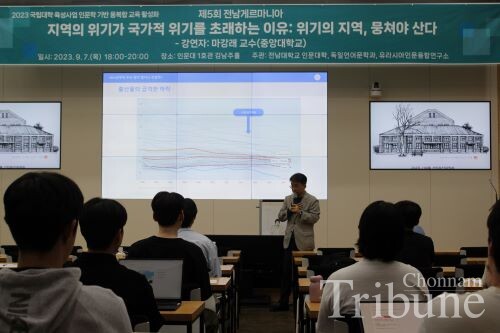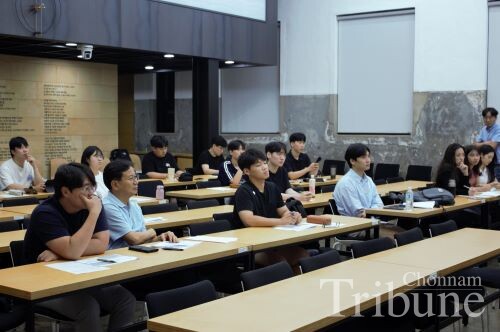독일언어문학과, 제5회 전남게르마니아 개최

The Department of German Language and Literature at Chonnam National University has hosted a series of public lectures called "Chonnam Germania," which introduces current humanistic sociology topics related to Germany. In the second semester of 2023, they plan to hold three guest lectures encompassing the theme 'Local Extinction'. The Chonnam Tribune looked into the first lecture handling the crisis of local extinction in Korea.
The first lecture from Ma Kang-rae (Professor, Dept. of Urban Planning and Real Estate, Chung-Ang University) was held at the Kim Nam-joo Hall located in the College of Humanities 1 building on September 7. Professor Ma started his lecture with the underlying question: Why is local extinction a problem? According to him, the answer was that it undermines national competitiveness. If the growth of wealth is not distributed equally and leans to one side, it results in asymmetrical growth between local and central areas. It triggers slow national growth in the end. In this context, reviving regions becomes one of the major issues that the government should solve.
Before discussing the solutions, he first mentioned the core reasons for local extinction. One is 'Low Birth and Aging'. The total fertility rate of Korea was 0.78 in 2022, which was the lowest birth rate among the 38 member countries of the Organization for Economic Cooperation and Development. On the other hand, the elderly population rate (population aged 65 or older to the total population) is rapidly increasing, and it recorded 17.5 percent in 2022. At the macro level, this phenomenon explains the population decrease in certain regions.

The other is the movement of the youth population. According to his study, there was a big change in industrial structures such as IT and AI in 2015. Since then, this has brought the advent of new industries, which prefer metropolises in terms of location requirements. To get a good job, the young generation is now leaving less-populated regions and gathering in Seoul or its surrounding urban areas.
However, it is complicated to deal with the problem, despite knowing the reasons. The current government has difficulty implementing policies to respond to local extinctions, just like the previous government did. In this situation, he suggests 'regional integration’ as a solution to face the crisis. It means that surrounding regions should integrate into a 'one-dense area' to narrow opportunity gaps between small and big cities and to prevent young people from leaving their regions. He emphasized the necessity of building a compact city that can make the innovation and economy of concentration easier than each region does separately. In an exclusive interview with the Tribune after the lecture, he said, "Thank you for the great interest in this topic. I hope discussions on how to create a high-density space in Gwangju expand continuously. CNU will be at the center of it."
By Choi Daniel, Reporter

